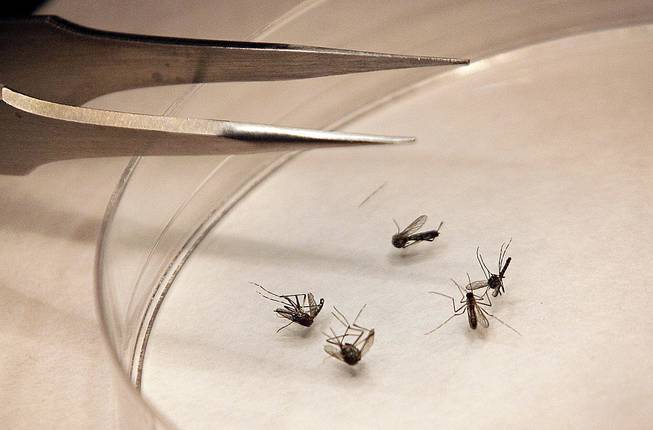
L.M. Otero / AP
In this Aug. 16, 2012, file photo, mosquitoes are sorted at the Dallas County mosquito lab in Dallas. Infectious diseases that used to be unknown in Nevada could become a greater threat here as mosquitoes associated with maladies such as the chikungunya virus spread around the globe.
Wednesday, Aug. 6, 2014 | 2 a.m.
It has a funky name, is transmitted by a particularly aggressive mosquito and has spread throughout the Caribbean and into the U.S. since its introduction to the Western Hemisphere late last year.
Chikungunya, a mosquito-borne virus previously limited to Asia, has now appeared in Nevada, too. The Southern Nevada Health District has confirmed that the illness was found in a Clark County resident returning from vacation, adding Nevada to the list of states touched by the virus' expansion in 2014.
The illness will most likely be limited in the state for now, health officials say, and the only nontravel-related cases found in the country so far have been in Florida.
But the insect most often tied to the chikungunya, the Asian tiger mosquito, is getting closer to the Silver State’s borders, buzzing its way up through Arizona and California. It is feasible that by the mid-2020s, Nevadans will be adding the virus to the list of most pressing reasons to avoid mosquito bites, along with West Nile and St. Louis encephalitis.
“It’s not impossible for them to get here, and they have already been seen at latitudes in Arizona up to where Southern Nevada is,” said Anette Rink, supervisor for the animal disease laboratory at the Nevada Department of Agriculture. “The chances are that in the next decade we’ll see a larger distribution throughout the United States and we’ll see them in Nevada.”
The Centers for Disease Control first announced the presence of chikungunya in the Western Hemisphere in December, when a case was found in the Caribbean island St. Martin. The disease had mostly been limited to Asia, and previous cases in the Western Hemisphere had always involved people who'd contracted the virus while traveling.
More than 600 cases have been reported in the United States this year, all but two contracted outside of the country. Between 2006 and 2013 there was an average of just 28 cases per year in the U.S. So far, two cases of chikungunya have been found in U.S. residents who had not recently traveled, both in southeastern Florida.
One Clark County resident was found to have the disease upon returning from the Caribbean, according to the Southern Nevada Health District. No cases were reported in the state last year.
“There was nothing unusual about where they traveled, and nothing abnormal in how they got it,” said Rick Sowadsky, senior epidemiologist for the State of Nevada Health Department. “Traveling to the Caribbean is a risk factor, and people should take precautions such as wearing long clothing and protecting themselves with (the insect repellant) DEET.”
Chikungunya, while rarely fatal, does pack a host of symptoms even more unpleasant than attempting to pronounce the disease (chik-un-GUHN-ya).
The symptoms, including headache, fever, rash and muscle and joint pain, are similar to dengue, which also is found in the Caribbean. The term chikungunya comes from the Makonde language, spoken in parts of Tanzania and Mozambique, and means “that which bends up,” referring to the sufferers who double over in pain.
There is no vaccine, nor specific treatment for the infection. Those who contract the disease typically recover in roughly a week, and infection is believed to result in lifelong immunity, according to the CDC.
Not all species of mosquito can carry a specific virus. The Asian tiger mosquito, an invasive species with white stripes on its body, first appeared in the continental United States in 1985.
“The majority of mosquitos we see in Nevada are dusk and dawn biters, but the Asian tiger is an aggressive daytime biting mosquito. People tend to complain about them because they notice them more,” said Vivek Raman, environmental supervisor for the Southern Nevada Health District.
Although the Asian tiger mosquito lives in most of the Southeast U.S. and has been found in New York, state health and agriculture officials said it hasn't been found in Nevada. Another known carrier of chikungunya, the yellow fever mosquito, also hasn't turned up in the state, Rink said.
“Generally speaking we didn’t know how well West Nile virus would transmit in the U.S. until it got here,” Rink said. “It turns out many different species of mosquito are conducive vectors for West Nile. It’s always possible that as a new disease is introduced to an area they will find there are more vectors than currently known.”
On Monday, the Southern Nevada Health District announced that mosquitoes trapped in several zip codes in the Las Vegas valley had tested positive for West Nile. Although no human cases of the disease have been reported this year, nine people contracted it last year and two died.
As chikungunya continues to spread, health officials say people traveling to the Caribbean should be extra diligent about taking precautions against mosquito bites. Also, with a recent series of storms in Southern Nevada leaving puddles and other standing water behind — which mosquitos use to breed — Clark County residents are reminded to follow general tips for avoiding bites and eliminating breeding areas.
Among those tips:
• Use insect repellents containing DEET, Picaridin, or oil of lemon eucalyptus.
• Wear pants and long-sleeved shirts when outdoors and spray repellent on clothes and exposed areas of skin.
• Eliminate all areas of standing water, including bird baths, unmaintained swimming pools, potted plants, wheelbarrows and anywhere else water can collect undisturbed.
• Make sure doors and windows have tight-fitting screens without tears or holes.

Join the Discussion:
Check this out for a full explanation of our conversion to the LiveFyre commenting system and instructions on how to sign up for an account.
Full comments policy